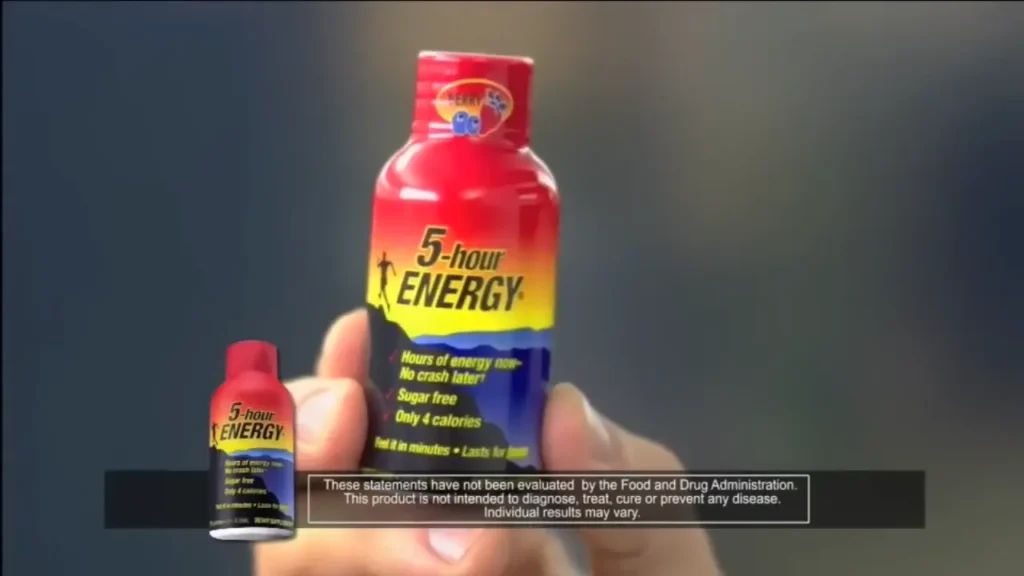How Long Does 5-Hour Energy Last?
The effects of a 5-hour Energy shot can vary from person to person, but generally, it is designed to help keep you alert for about five hours.
The duration of its effects can depend on several factors including your body mass, metabolism, tolerance to caffeine, and overall health.
Some people may experience the effects for a shorter period, while others might feel energized for longer. Always be cautious with caffeine intake to avoid potential side effects.Duration of 5-hour Energy’s Effectiveness
5-hour Energy is a widely consumed energy drink that promises to boost your energy for five hours with minimal caffeine, comparable to a single cup of coffee, and no sugar crash. But how accurate are these claims?
Caffeine Content and Safety
Contrary to what the label might suggest, tests indicate that 5-hour Energy might contain up to 200mg of caffeine, more than the typical 130mg found in coffee.
While caffeine is generally safe and can enhance alertness and cognitive function, it’s important to be mindful of its effects on sleep and anxiety levels, particularly for those sensitive to caffeine.
B Vitamins and Overconsumption
The product boasts extremely high levels of B vitamins, far exceeding the daily recommended amounts. While B vitamins can aid in improving concentration, excessive amounts in 5-hour Energy could lead to side effects like skin tingling or numbness if consumed in large quantities, especially if you already take a multivitamin.
Evaluation of Claims
The key ingredient that contributes to the feeling of alertness from 5-hour Energy is caffeine. The additional ingredients, while supportive of nutrient delivery, do not significantly enhance energy levels beyond what caffeine alone provides.
Therefore, the claim that it offers superior, extended energy may be overstated.
Conclusion
While 5-hour Energy may offer a quick caffeine boost, it is likely not vastly different from other caffeinated beverages. It’s important to consume it responsibly, especially considering the potentially higher caffeine content and the rich amounts of B vitamins.
Those already consuming multivitamins should be cautious to avoid excessive intake.
Also Read: Is Nitro Pepsi Good For You?
Understanding the Impact of Daily Consumption of 5-Hour Energy

5-Hour Energy is commonly used by many to maintain alertness and enhance focus. However, daily consumption can lead to several health issues due to its high concentration of active ingredients.
Key Ingredients and Their Effects
The formula of 5-Hour Energy includes caffeine, taurine, glucuronolactone, malic acid, N-acetyl L-tyrosine, L-phenylalanine, sucralose, citicoline, B-vitamins, and various flavors. These components are found naturally in the body but are present in much higher quantities in the drink.
Potential Health Risks
- Cardiovascular Issues: The drink’s high caffeine content (over 200 mg) can cause heart palpitations, a rapid heart rate, and elevated blood pressure, increasing the risk of cardiovascular diseases.
- Dehydration: Ingredients like caffeine and sucralose may lead to dehydration, causing symptoms such as fatigue and reduced cognitive abilities.
- Weight Management Challenges: Artificial sweeteners may promote a preference for sweet tastes, potentially leading to poor dietary choices and weight gain. Studies have linked sucralose to an increased risk of Type 2 diabetes.
- Dental Health: The acidic nature and sweeteners in 5-Hour Energy can erode tooth enamel, increasing the risk of tooth decay.
- Sleep Disruption: High levels of caffeine can disrupt sleep patterns, resulting in insomnia and non-restorative sleep.
- Dependence: The addictive potential of caffeine and sweeteners in 5-Hour Energy can lead to dependence, with withdrawal symptoms appearing if consumption is abruptly ceased.
- Headaches: Caffeine causes constriction of brain blood vessels. Stopping intake suddenly can lead to headaches due to rapid dilation of these vessels.
Conclusion
While 5-Hour Energy can provide a temporary boost, the potential health risks associated with daily consumption are significant. It is important to consider these effects and limit intake, particularly if you have underlying health conditions or are sensitive to caffeine.
Ingredients in 5-hour Energy

The drink contains caffeine, B vitamins, sucralose (a sugar substitute), and an “energy blend” including amino acids like phenylalanine and tyrosine.
While these components are linked to increased energy and metabolism, their actual impact on sustained alertness and performance is subject to debate.
Effects of 5-Hour Energy on Kidney Health
5-Hour Energy and similar energy drinks contain ingredients that could be harmful to kidney health if consumed frequently.
Impact on Kidneys
- Increased Kidney Workload: The caffeine in energy drinks like 5-Hour Energy can significantly elevate the kidneys’ workload. This could lead to dehydration and disturb the balance of electrolytes in the body.
- Reduced Blood Flow: Caffeine also causes the blood vessels in the kidneys to constrict, potentially decreasing blood flow to these organs and causing long-term damage.
- Risk of Diabetes: Energy drinks often contain high levels of sucralose, an artificial sweetener that has been linked to an increased risk of developing type 2 diabetes, a condition that can adversely affect kidney function.
Recommendations
To safeguard kidney health, it is crucial to moderate the consumption of energy drinks and maintain proper hydration. Regular water intake is essential, especially when consuming caffeinated beverages, to help mitigate the risk of kidney-related issues.
Also Read: Is Cellucor C4 Energy Good For You?Comparing Natural and Synthetic Caffeine in Energy Drinks
5-Hour Energy and the debate around its caffeine content raise questions about its impact on health.
Natural vs. Synthetic Caffeine
- Natural Caffeine: Derived from plants like cacao and guarana, natural caffeine is released slowly into the body. This slow release helps to prolong the energy boost and minimizes side effects like jitteriness. Additionally, natural caffeine includes antioxidants which may reduce the risk of diseases like heart disease and Alzheimer’s.
- Synthetic Caffeine: Found in many energy drinks, including 5-Hour Energy, synthetic caffeine provides a quick energy burst but may lead to a rapid crash. This type of caffeine can also cause restlessness and sleep disturbances.
Concerns with Artificial Ingredients
- Sucralose: This artificial sweetener, used in 5-Hour Energy, has been linked to various health issues. It can disrupt gut bacteria, increase appetite, and potentially affect blood sugar regulation. Over time, it may contribute to insulin resistance and associated health problems like type 2 diabetes.
- Natural Flavors: The term “natural flavors” in the ingredients of 5-Hour Energy can be misleading. While these flavors are derived from natural sources, the extraction and processing methods might involve chemicals or high heat, which doesn’t align with the typical consumer’s view of ‘natural’.
Conclusion
When choosing between beverages like 5-Hour Energy which contains synthetic caffeine and those with natural caffeine, consider the broader health impacts. The immediate boost from synthetic caffeine contrasts with the more sustained energy from natural sources, which comes with fewer health risks.
Additionally, the presence of artificial ingredients like sucralose and ambiguously labeled “natural flavors” suggests that consumers should approach these products with caution, weighing potential health risks against the benefits of quick energy.
Healthier Substitutes for 5-Hour Energy Drinks

Seeking alternatives to 5-Hour Energy for a healthier energy boost? Here are some excellent options that not only energize but also offer additional health benefits:
Filtered Water
Essential for hydration, filtered water is free from harmful contaminants often found in tap water. It aids in maintaining alertness and focus throughout the day without any additives.
Green Tea
A natural source of caffeine, green tea provides a gentle boost in energy. Rich in antioxidants, it enhances mental clarity and offers health benefits without the harsh effects associated with synthetic caffeine.
Fresh Fruit Juice
Juicing fresh fruits can yield a drink rich in vitamins, minerals, and antioxidants, providing a natural surge of energy. It’s a refreshing option that also supports inflammatory health.
Coconut Water
Known for its high electrolyte content, coconut water is ideal for rehydration. It also includes potassium and magnesium, which support muscle function and energy levels.
Herbal Tea
Varieties like chamomile, peppermint, and ginger tea are not only soothing but also beneficial for reducing stress and enhancing energy without caffeine. These teas offer a calming effect, making them a great choice for steady, non-jittery energy.
Black Coffee
For those who prefer a caffeine boost, black coffee is a simple, low-calorie option. When made with filtered water and consumed without additives, it serves as a healthier alternative to commercial energy drinks.
These alternatives provide a range of benefits, from improved hydration to natural energy boosts, making them superior choices over processed energy drinks like 5-Hour Energy.
Also Read: Is Starbucks Doubleshot Energy Good For You?Risks of Energy Drinks for Children
Energy drinks like 5-Hour Energy can pose serious health risks to children. Here’s why they might be harmful:
Effects of Caffeine on Children
Caffeine is a powerful stimulant found in 5-Hour Energy drinks. In children, whose bodies are still developing, caffeine can significantly affect heart rate and blood pressure, potentially causing anxiety. These impacts are particularly concerning for young, growing bodies.
Additional Health Concerns
Beyond caffeine, energy drinks often contain high levels of sugar and other additives that can contribute to obesity and dental issues in children. Moreover, caffeine can disrupt sleep patterns, crucial for a child’s cognitive and emotional development.
Composition of 5-Hour Energy
The Energy Blend in 5-Hour Energy includes:
- Taurine
- Glucuronic Acid (from Glucuronolactone)
- Malic Acid
- N-Acetyl L-Tyrosine
- L-Phenylalanine
- Caffeine (200 mg in Regular Strength, 230 mg in Extra Strength)
- Citicoline
Other ingredients are purified water, natural and artificial flavors, sucralose, potassium sorbate, sodium benzoate, and EDTA for freshness.
Comparison with Other Caffeinated Beverages
For perspective:
- A cup of organic coffee contains approximately 95 mg of caffeine.
- A cup of organic green tea has about 30-50 mg of caffeine.
Given the high caffeine content in 5-Hour Energy drinks, they are not suitable for children. It’s crucial for parents to monitor and limit their children’s consumption of such beverages to safeguard their health and development.
FAQs: How Long Does 5-Hour Energy Last?
How long does 5-hour Energy take to kick in?
The effects of 5-hour Energy typically begin within 45 minutes, as 99% of the caffeine is absorbed during this time. The onset can vary slightly depending on whether you have eaten or not.
Does 5-hour Energy go bad after opening?
Once opened, it’s best to use or discard 5-hour Energy within 72 hours. Refrigeration is not necessary.
How much caffeine is in 5-hour Energy?
5-hour Energy comes in two formulations. The Regular Strength version contains about 200 mg of caffeine, equivalent to an 8-ounce cup of premium coffee. The Extra Strength version has 230 mg of caffeine, similar to a 12-ounce cup of premium coffee.
Is 5-hour Energy bad for you?
Consuming 5-hour Energy can increase the risk of heart disease due to its high levels of synthetic caffeine. Regular intake may lead to elevated blood pressure and heart rate, potentially causing heart conditions such as irregular heartbeat and hypertension.
How long does it take for 5-Hour Energy to wear off?
The effects of 5-Hour Energy typically start to diminish within an hour or two after consumption as the caffeine levels decrease. It generally takes about 5 to 6 hours for the caffeine in your bloodstream to reduce by half, known as its “half-life.”
Will 5-Hour Energy keep me awake?
5-Hour Energy is designed to help keep you alert and energized, whether you’re working, traveling, or engaged in weekend activities. It can be a useful aid to maintain alertness during busy times.
Does 5-Hour Energy make you tired after?
After the initial boost, energy drinks like 5-Hour Energy can lead to fatigue. The high caffeine and sugar content can disrupt sleep patterns, contributing to tiredness once the effects wear off.
Is it safe to drink 5-Hour Energy?
Drinking 5-Hour Energy can lead to side effects such as nausea, restlessness, and rapid heart rate due to overstimulation. The artificial ingredients in the product have been associated with serious health issues, including chest pains and seizures. Additionally, there are concerns about the potential carcinogenic properties of some components. Research indicates that teens and young adults may experience heightened anxiety after consuming 5-Hour Energy.
Is 5-Hour Energy halal?
Yes, 5-Hour Energy is considered halal, along with other energy products like Bang and Rockstar.





